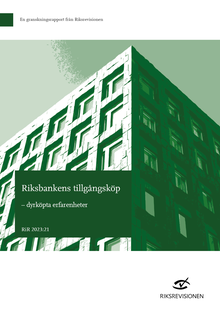The Riksbank’s purchase of securities: limited effect at a high cost
The Swedish National Audit Office does not find any evidence that the Riksbank’s extensive purchase of securities has had appreciable effects on inflation. The Riksbank underestimated the risks, and the purchases will lead to hefty losses.

Photo: The Riksbank
In 2015–2022, the Riksbank purchased securities for considerable amounts. The main purpose was to stimulate inflation which, at the time, was low in relation to the inflation target of 2 per cent. At the close of 2021, the holding amounted to SEK 975 billion.
The Swedish National Audit Office (Swedish NAO) has audited whether the Riksbank’s use of asset purchases has been effective and transparent. The audit shows that the purchases of securities have not been effective, but that reporting has been largely transparent. The Swedish National Audit Office further notes that the costs will be considerable.
“We have not found evidence that the purchases have had any appreciable effect on inflation. Meanwhile, the costs of the purchases will be considerable, which will ultimately affect central government finances,” says Auditor General Helena Lindberg.
The audit also shows that the purchases of securities early in the pandemic helped to curb unease in the economy and stabilise financial markets.
The Riksbank based its purchases of securities on relatively solid grounds. However, the asset purchases were an unproven measure and knowledge was initially poor. The impact assessments were therefore marked with a high degree of uncertainty.
Inflation and interest rates rose rapidly in 2022, which means the Riksbank is ultimately expected to make a loss of about SEK 61 billion on its securities purchases. This also led to a sharp drop in the value of the bonds purchased by the Riksbank, which contributed to equity turning negative.
“That was an unexpected development. However, the Riksbank’s cost estimates have been based on the assumption that the policy rate would rise very slowly. The risks of losses have thus been underestimated,” says Jörgen Appelgren, project leader for the audit.
To cover the losses, and to restore the Riksbank’s equity, the central government will need to contribute about SEK 80 billion, according to the Riksbank’s preliminary assessment. Besides, the Riksbank is not expected to be able to issue any dividends to the central government for the foreseeable future.
The Riksbank’s reporting on its asset purchases has largely been comprehensive and transparent, but has not been sufficiently clear concerning the size of the costs that the purchases were expected to entail – and what this could lead to.
Recommendations
The Swedish NAO makes the following recommendations to the Riksbank:
- Avoid purchasing assets with the primary purpose of influencing inflation.
- Avoid large long-term holdings of government bonds, so that there is a possibility to purchase them in future financial crises.
Report asset purchase costs and side effects more clearly to the public and the Riksdag, for example in its Account of monetary policy.
Press contact: Olle Castelius, phone: +46 8-5171 40 04.
Presskontakt: Olle Castelius , telefon: 08-5171 42 06.
Share in social media and by e-mail
Contact form
Send your questions or comments via the form below and we will make sure that they reach the right member of staff. Please state if your question concerns the information on this particular page.


